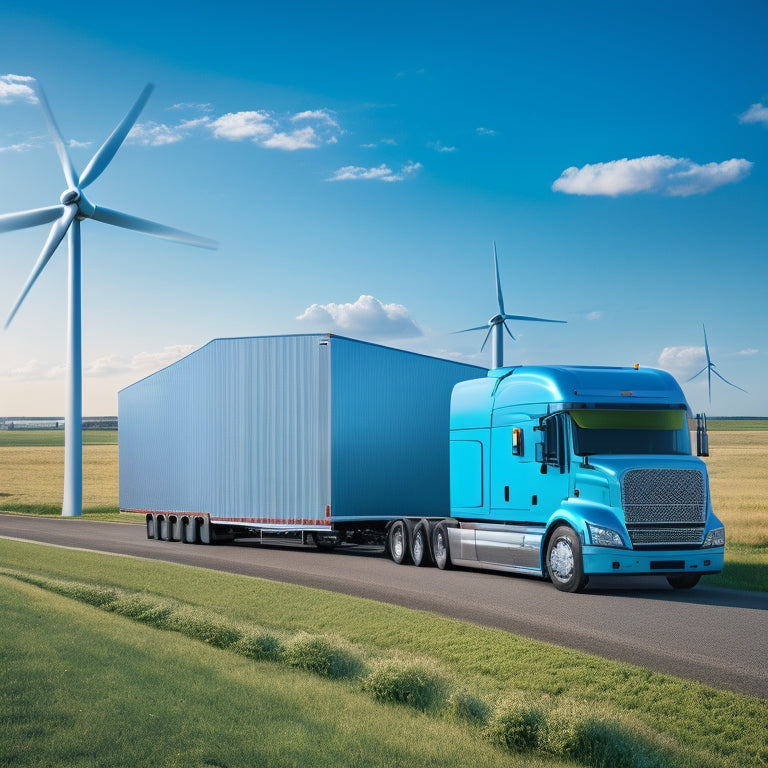
10 Truck Refrigeration Units Running on Renewable Energy
Share
You're on the cusp of a revolutionary shift in the transportation industry, where 10 innovative truck refrigeration units are poised to transform the way goods are transported, all while running on renewable energy sources. From solar-powered refrigeration units to electric cooling systems, these units harness renewable energy to reduce carbon footprint and operating costs. You'll discover solutions that utilize solar, wind, or hydro power, as well as alternative energy sources like hydrogen fuel cells and biofuels. As you explore these cutting-edge technologies, you'll uncover the potential to greatly decrease greenhouse gas emissions and create a more sustainable future.
Key Takeaways
• Solar-powered refrigeration units reduce carbon footprint and ensure produce arrives in peak condition, ideal for farmers and logistics providers.
• Electric cooling systems for trucks enhance efficiency, reduce emissions, and optimize cooling system design for efficient heat transfer and energy consumption.
• Adopting renewable energy sources like solar, wind, or hydro power minimizes environmental impact and reduces emissions and energy costs.
• Shifting to renewable energy-powered units can reduce a fleet's carbon footprint by up to 70% through eco-friendly fleet conversions and effective management strategies.
• Zero-emission refrigeration units powered by renewable energy sources eliminate fossil fuels, lower operating costs, and improve air quality while complying with regulations.
Solar Refrigeration for Fresh Produce
As you transport perishable goods, solar-powered refrigeration units can greatly reduce your carbon footprint while maintaining ideal temperatures for fresh produce. This eco-friendly solution is especially important for farmers and logistics providers who prioritize crop monitoring and farm logistics.
By harnessing the power of the sun, you can guarantee that your produce arrives at its destination in peak condition, reducing food waste and increasing customer satisfaction.
Solar refrigeration units are designed to provide consistent cooling temperatures, even in areas with limited grid access. This makes them ideal for rural areas where farm logistics can be challenging.
With real-time monitoring capabilities, you can track temperature fluctuations and receive alerts if there's a deviation from the best range. This data-driven approach enables you to make informed decisions about your crop monitoring and logistics strategies, ensuring that your produce reaches consumers in the freshest possible state.
Electric Cooling Systems for Trucks
As you explore electric cooling systems for trucks, you'll discover that electric motor technology plays an essential role in enhancing efficiency and reducing emissions.
You'll need to contemplate the design of the cooling system, taking into account factors such as heat exchanger sizing and airflow management.
Electric Motor Technology
Electric motor technology has emerged as a viable alternative to traditional diesel-powered refrigeration units, offering a more environmentally friendly and cost-effective solution for truck refrigeration systems.
As you consider electric motor technology for your truck refrigeration needs, it's important to focus on the key components that guarantee efficient and safe operation. One critical aspect is motor insulation, which plays a significant role in protecting the motor windings from electrical surges and thermal stresses. By using high-quality motor insulation materials, you can minimize the risk of motor failure and ensure continuous operation.
Another essential component is copper wiring, which provides excellent electrical conductivity and durability. Copper wiring is vital for efficient energy transmission and helps reduce energy losses, resulting in improved system performance.
When selecting electric motor technology for your truck refrigeration system, look for systems that incorporate high-quality motor insulation and copper wiring to ensure reliable and efficient operation. By doing so, you can reduce your environmental impact while maintaining excellent refrigeration performance.
Cooling System Design
You'll need to optimize your cooling system design to guarantee efficient heat transfer and minimize energy consumption in your electric truck refrigeration unit. This requires careful consideration of thermal simulation, heat exchange, and cooling capacity.
Air flow optimization is essential to guarantee uniform cooling, while insulation materials play an important role in reducing heat gain. Selecting the right refrigerant is also necessary, as it affects the system's overall performance and environmental impact.
When designing the cooling system, you'll need to integrate components seamlessly to ensure efficient heat transfer. Temperature control is critical to maintain the desired temperature range and prevent overheating.
A well-designed cooling system won't only reduce energy consumption but also enhance the overall safety of your electric truck refrigeration unit.
Renewable Energy for Cold Chain
Cold chain logistics can greatly reduce their carbon footprint by adopting renewable energy sources to power refrigeration units, such as solar or wind power. This shift towards renewable energy can markedly minimize the environmental impact of cold storage operations. You can harness energy from natural resources to power your refrigeration units, reducing your reliance on fossil fuels and decreasing greenhouse gas emissions.
| Energy Source | Advantages |
|---|---|
| Solar Power | Zero emissions, low maintenance, and reduced energy costs |
| Wind Power | High energy output, reduced noise pollution, and lower operating costs |
| Hydro Power | Reliable energy supply, low visual impact, and reduced emissions |
Green Initiative for Fleet Owners
As a fleet owner, you're likely aware of the environmental impact of your refrigerated trucks. By shifting to eco-friendly fleet conversions, you can greatly diminish your carbon footprint and contribute to a more sustainable future.
Eco-Friendly Fleet Conversions
Converting your fleet to eco-friendly refrigeration units can greatly reduce your company's carbon footprint and operating costs. By switching to renewable energy-powered refrigeration systems, you can minimize your environmental impact while also saving on fuel and maintenance expenses.
Effective fleet management is essential to the success of your eco-friendly fleet conversion. This includes implementing driver training programs that focus on efficient driving practices, such as maintaining ideal temperatures, reducing idle time, and optimizing routes. Well-trained drivers can greatly reduce energy consumption and minimize wear and tear on your refrigeration units.
| Fleet Management Strategy | Driver Training Focus | Expected Outcome |
| Implement route optimization | Efficient driving practices | Reduced fuel consumption |
| Conduct regular maintenance | Temperature control techniques | Extended equipment lifespan |
| Monitor energy consumption | Idle reduction strategies | Lower operating costs |
Reducing Carbon Footprint
By shifting to renewable energy-powered refrigeration units, you can reduce your fleet's carbon footprint by up to 70%, greatly contributing to a cleaner environment and a more sustainable future. This significant reduction in emissions not only benefits the environment but also prepares your fleet for the impending carbon pricing regulations. As governments worldwide implement carbon pricing, fleet owners who adopt renewable energy-powered refrigeration units can avoid potential financial burdens.
Moreover, by taking genuine steps towards reducing your carbon footprint, you can mitigate Greenwashing risks and enhance your brand reputation. Greenwashing occurs when companies claim to be environmentally friendly but fail to deliver tangible results. In contrast, renewable energy-powered refrigeration units provide a tangible, measurable reduction in emissions, allowing you to confidently promote your eco-friendly initiatives.
Zero Emissions Refrigeration Units
You'll find that zero emissions refrigeration units, powered by renewable energy sources like solar or wind power, are becoming increasingly viable alternatives to traditional fossil fuel-based systems. These innovative units eliminate the need for fossil fuels, greatly reducing greenhouse gas emissions and minimizing the carbon footprint of refrigeration operations. By leveraging renewable energy, you can greatly decrease your environmental impact while maintaining top refrigeration performance.
Some key benefits of zero emissions refrigeration units include:
-
Lower operating costs: Renewable energy sources can reduce energy expenses, leading to substantial cost savings over time.
-
Improved air quality: By eliminating fossil fuels, these units minimize air pollution and promote a healthier environment.
-
Compliance with regulations: Zero emissions refrigeration units can help you meet stringent emissions standards and regulations, ensuring compliance and avoiding potential fines.
As the demand for eco-friendly solutions grows, fuel cells are emerging as a promising technology for powering refrigeration units. By integrating fuel cells with renewable energy sources, you can create a highly efficient and sustainable refrigeration system that minimizes emissions and maximizes performance.
Solar Powered Reefer Trailers
As you explore solar powered reefer trailers, you'll notice that the importance of solar panels plays a vital role in determining the overall performance of the system.
With advancements in photovoltaic technology, modern solar panels can achieve efficiencies of up to 22%, allowing for more effective harnessing of renewable energy.
Solar Panel Efficiency
Your solar-powered reefer trailer's refrigeration unit relies on high-efficiency solar panels to generate the power it needs to keep perishable goods cool during transport. When it comes to solar panel efficiency, every percentage point counts. High-efficiency solar panels are essential to guarantee your trailer's refrigeration unit receives the power it needs to maintain the ideal temperature.
Here are some key factors that impact solar panel efficiency:
-
Panel Performance: The efficiency of your solar panels depends on the type and quality of the panels. Look for panels with high-efficiency ratings (above 20%) to maximize energy harvesting.
-
Energy Harvesting: The amount of energy your solar panels can harvest depends on the size of the panel, the amount of sunlight it receives, and the efficiency of the panel.
-
Temperature Coefficient: High temperatures can reduce solar panel efficiency. Look for panels with a low temperature coefficient to minimize efficiency losses.
Off-Grid Refrigeration
By integrating solar panels and energy storage systems, off-grid refrigeration units in solar-powered reefer trailers can maintain a consistent temperature range, ensuring the integrity of perishable goods during transportation.
You can rest assured that your cargo will remain at the ideal temperature, even when traveling to remote communities with limited access to electrical grids. This is particularly important for food storage, where temperature fluctuations can lead to spoilage and foodborne illnesses.
Off-grid refrigeration units are designed to provide a reliable and consistent cooling environment, even in areas with limited infrastructure. By harnessing the power of solar energy, you can reduce your reliance on fossil fuels and lower your carbon footprint. This not only benefits the environment but also helps you save on fuel costs.
With solar-powered reefer trailers, you can confidently transport perishable goods to remote communities, knowing that your cargo will arrive in ideal condition. By choosing off-grid refrigeration units, you're not only ensuring the safety of your cargo but also contributing to a more sustainable future.
Eco-Friendly Truck Refrigeration Options
You're likely familiar with traditional diesel-powered truck refrigeration units, but eco-friendly alternatives are emerging, offering a more sustainable solution for temperature-controlled transportation. As the transportation industry shifts towards a greener future, innovative solutions are being developed to reduce carbon emissions and improve fuel efficiency.
Some eco-friendly truck refrigeration options include:
-
Electric refrigeration units: Powered by electric motors, these units reduce emissions and operate quietly, making them ideal for urban areas.
-
Solar-powered refrigeration: By harnessing the power of solar energy, these units provide a sustainable solution for refrigeration, especially in areas with high sunlight exposure.
-
Hybrid refrigeration systems: Combining different power sources, such as diesel and electric, these systems optimize fuel efficiency and reduce emissions.
These eco-friendly options not only reduce the environmental impact of temperature-controlled transportation but also improve vehicle insulation, resulting in better fuel efficiency and reduced operating costs.
As the industry continues to evolve, these innovative solutions will play an important role in shaping a more sustainable future for truck refrigeration.
Alternative Energy for Freight
As the freight industry seeks to shift towards decarbonization, alternative energy sources like hydrogen fuel cells, biofuels, and compressed natural gas are being explored to power refrigeration units and trucks, offering a cleaner alternative to traditional fossil fuels. You're likely aware that the freight industry is a significant contributor to greenhouse gas emissions, and it's vital to move towards cleaner energy sources. Alternative energy options can reduce emissions while maintaining the efficiency of your freight operations.
When it comes to freight infrastructure, energy storage is a critical component. You'll need to take into account the energy density and storage capacity required to support your refrigeration units and trucks. Hydrogen fuel cells, for instance, require advanced energy storage systems to guarantee a stable power supply.
Similarly, biofuels and compressed natural gas demand specialized storage facilities to ensure safe handling and transportation. By investing in alternative energy sources and advanced energy storage systems, you can create a more sustainable freight infrastructure that prioritizes both efficiency and safety.
Sustainable Refrigeration for Trucks
Sustainable refrigeration for trucks is becoming a critical component of the freight industry's decarbonization efforts, with companies increasingly adopting electric transport refrigeration units (eTRUs) and hybrid systems that can markedly decrease greenhouse gas emissions and operating costs.
As you navigate the complexities of cold chain management, you'll want to take into account the following benefits of sustainable refrigeration:
-
Improved Fleet Management: By integrating eTRUs into your fleet, you can reduce fuel consumption and lower emissions, resulting in cost savings and a reduced carbon footprint.
-
Enhanced Driver Safety: With hybrid systems, you can maintain a consistent temperature control, reducing the risk of cargo spoilage and ensuring driver safety on the road.
-
Optimized Supply Logistics: By adopting sustainable refrigeration solutions, you can streamline your warehouse storage and route optimization, resulting in increased fuel efficiency and reduced operational costs.
Clean Energy for Commercial Fleets
Your commercial fleet can greatly reduce its environmental impact by leveraging clean energy sources to power truck refrigeration units, such as solar panels, wind turbines, or biofuels. By shifting to renewable energy, you can notably decrease greenhouse gas emissions, reducing your fleet's carbon footprint. This not only benefits the environment but also helps you comply with increasingly stringent energy policies and regulations.
Effective fleet management is vital in implementing clean energy solutions. You'll need to assess your fleet's energy requirements, identify suitable clean energy sources, and develop a detailed plan for integration. This may involve investing in new technologies, such as electric or hybrid refrigeration units, or retrofitting existing units to run on biofuels. Additionally, you'll need to take into account energy storage solutions to guarantee a reliable power supply.
As energy policy continues to evolve, embracing clean energy solutions will become increasingly important for commercial fleets. By taking proactive steps towards sustainability, you can mitigate the risks associated with changing regulations and stay ahead of the competition.
Frequently Asked Questions
Can Solar Panels Be Installed on Existing Refrigeration Units?
You can install solar panels on existing refrigeration units, but make sure to adjust panel angles for maximum energy harvesting, and consult industry standards for safe integration to prevent electrical hazards and system malfunctions.
Are Renewable Energy Systems Compatible With All Truck Models?
Did you know that 75% of trucking fleets have customized vehicles? When it comes to renewable energy systems, you'll need to take into account truck modifications, fleet analysis, and vehicle integration to guarantee engine compatibility, but be aware that some models may have limitations.
How Often Do Solar Panels Require Maintenance and Cleaning?
You'll need to conduct efficiency checks and energy audits every 6-12 months to guarantee peak solar panel performance, as dirt and debris can reduce energy output by up to 25%, compromising system safety and reliability.
Do Renewable Energy Systems Affect the Cooling Performance of Units?
You'll find that renewable energy systems typically don't compromise the cooling performance of units, maintaining peak energy efficiency and cooling capacity, ensuring reliable temperature control and a safe storage environment.
Are There Any Government Incentives for Adopting Green Technology?
You'll find various government incentives for adopting green technology, including tax credits, grant funding, carbon offsets, regulatory exemptions, and green bonds, which can greatly reduce the costs and risks associated with sustainable investments.
Related Posts
-

7 Best Cool Roof Rebates for Energy-Savvy Homeowners
You're an energy-savvy homeowner looking to install a cool roof, and you're wondering which rebates can help you save...
-

7 Best Home Hydrogen Fuel Cells for Clean Power
You're considering adopting hydrogen fuel cells for clean power at home, but you want to know the best options. Reput...
-

Why Grow Up? Vertical Gardens Transform Urban Living
As you change your urban living space, you're not just growing up - you're bringing nature back into the heart of the...


